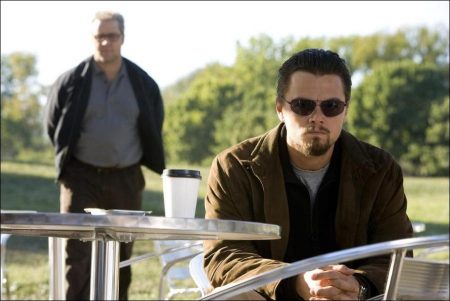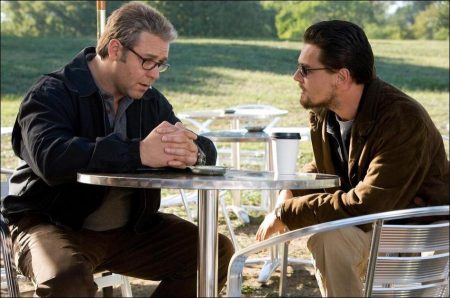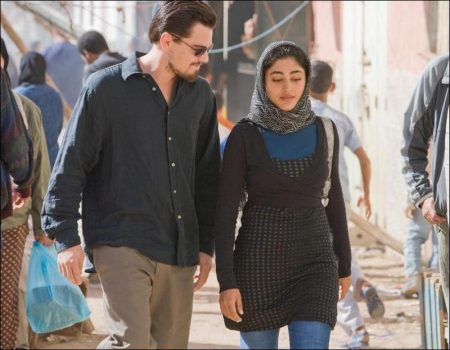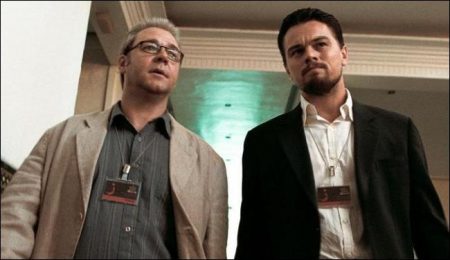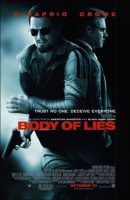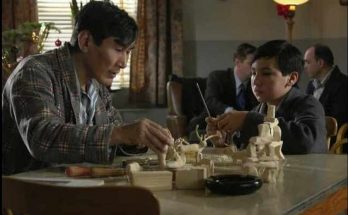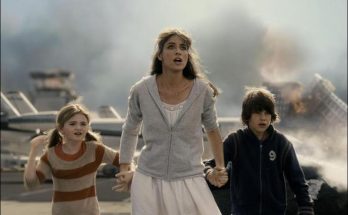Tagline: Trust no one. Deceive everyone.
Body of Lies movie storyline. Roger Ferris (Leonardo DiCaprio) is the best man U.S. Intelligence has on the ground, in places where human life is worth no more than the information it can get you. In operations that take him around the globe, Ferris’ next breath often depends on the voice at the other end of a secure phone line—CIA veteran Ed Hoffman (Russell Crowe).
Strategizing from a laptop in the suburbs, Hoffman is on the trail of an emerging terrorist leader who has orchestrated a campaign of bombings while eluding the most sophisticated intelligence network in the world. To lure the terrorist out into the open, Ferris will have to penetrate his murky world, but the closer Ferris gets to the target, the more he discovers that trust is both a dangerous commodity and the only one that will get him out alive.
In the murky underworld of today’s high-stakes global espionage, power is measured not by weaponry or technology, but by the amount of vital information one can acquire and control—or appear to. “Information is the bottom line,” states “Body of Lies” director Ridley Scott, “and the subtext of that could be that you cannot trust anyone, not even your best friend. Turn your back for a second and you will be used. And if you are running an organization that is important to national security, without that attitude you will be weaker and vulnerable. That’s the job.”
“Body of Lies” is based on the novel of the same name by author David Ignatius, a veteran journalist who covered the CIA and Middle Eastern affairs for 10 years for The Wall Street Journal before joining The Washington Post, where he is currently an associate editor and columnist. Scott, who read the book when it was still in galley form, offers, “It has an unusually incisive view into what actually happens up on the front lines, and the people at the front who make a difference.”
Body of Lies is a 2008 American action spy film directed and produced by Ridley Scott. Set in the Middle East, it follows the attempts of the CIA and Jordanian Intelligence to catch “al-Saleem”, a terrorist. Frustrated by their target’s elusiveness, differences in their approaches strain relations between a CIA operative, his superior, and the head of Jordanian Intelligence.
About the Production
Producer Donald De Line remarks, “David’s book is such a smart, well-crafted spy thriller about the kinds of people and levels of deception it takes to penetrate a country, a culture and, ultimately, the enemy. We really felt it had everything going for it in terms of a great movie plot.”
Scott worked closely with Oscar-winning screenwriter William Monahan to bring the novel’s gritty urgency and combative character dynamics to the screen. The director notes, “There were so many interesting dimensions to the story, the way the plot develops and the characters have to adjust and change. It’s a very exciting journey.”
Leonardo DiCaprio, who had previously worked with William Monahan on “The Departed,” states, “Monahan’s adaptation was fantastic. He’s great with information and disinformation, and cat-and-mouse dilemmas between characters.”
“The story is really gripping; you really have to pay attention to all the twists and turns,” De Line says. “And it also has the kind of exciting action sequences that Ridley is so good at and always does with his own distinctive style.”
DiCaprio agrees. “There are huge action elements to this movie, but the plot is very intricate. At the end of the day, it was how advanced the thinking of the CIA was and how that translated into the story that really sparked our interest and engaged us. As we worked on the movie, we became more and more fascinated with how an organization like this operates against an enemy that is extremely difficult to find in a world so unfamiliar to them.”
DiCaprio stars as CIA operative Roger Ferris, who devises an audacious plan to lure a terrorist leader, Al-Saleem, out of hiding by making it appear that a rival—and entirely fake—organization has become as deadly and effectual as Al-Saleem’s own. But the smoke and mirrors the agent conjures so deftly are cloaked in layers of simultaneous subterfuge perpetrated by his own superior, Ed Hoffman. A ruthless strategist, Hoffman will stop at nothing in the name of national security, even if it means sacrificing his best man in the field.
As Ferris’ un-retractable scheme gains momentum, conflicts with his two closest allies threaten to converge with a crisis of conscience that leaves him painfully vulnerable. Will Hoffman betray him, as he has so many others? Meanwhile, if the head of Jordanian intelligence finds out Ferris is running a secret operation to snare Al- Saleem, Ferris’ life expectancy in Jordan will be measured out in minutes. Ultimately, Ferris’ survival and the success of his mission may depend on the one man he knows he can trust: himself.
Russell Crowe, who stars as Ed Hoffman, comments, “Obviously, it’s a movie and is not meant to be taken as fact, but it was important to me to give people an idea of what it really takes, in terms of deception, to operate an organization like the CIA, especially in a place where there’s a definite culture clash. You have to stand back a long way to see where that river runs.”
“A subject that has always interested me as a writer is deception, and the process by which we deceive our adversaries,” says Ignatius. “I began thinking about how you would get inside an organization that proves nearly impossible to penetrate. If you couldn’t get inside, could you make them think you’re inside? The spy business is a lot like journalism. It’s about identifying people who know things, gaining their trust, and then getting them to cross a line and tell you things they might not want to initially.”
It was this visceral, down-and-dirty look into the real lives of intelligence operatives that especially intrigued Scott. “I liked the idea of exploring the contrasts between the man on the ground and the man at the helm,” he asserts.
Monahan notes, “The story showed the intelligence world more or less as it is, with, if anything, more pragmatism and less political coloring than you find in the actual CIA. The frailties of Ed Hoffman appealed to me…we all know a Hoffman. Ferris’ story was appealing to me in that it is all about individual conscience.”
Executing 21st-century espionage in one of the world’s most dangerous regions means getting information by any means necessary—and putting your life on the line in a world where what you know can be your best asset…or your worst liability. Ed Hoffman is the head of the division, but he does not know nothing until he steals it from the guy on the ground, and that’s me.
No one feels the pressure on the ground more than Roger Ferris, an exceptionally skilled field operative assigned to gather real-time intelligence on terrorist operations. “Ferris is someone who has very much committed his life to stopping terrorism and is risking his life every day to do so,” says DiCaprio. “He’s well-versed in weapons training and hand-to-hand combat, but he’s also a really intelligent, highly effective field agent who has immersed himself in Middle Eastern culture. He knows the language and the culture and respects the attitudes and customs of the people. He’s become very skilled at forging relationships and infiltrating terrorist networks.”
“Ferris is a man who feels it on his fingertips,” says Ignatius. “The people and the culture have gotten under his skin much the way they got under mine.”
As part of his preparation for the film, DiCaprio delved into Ignatius’ book and consulted the author and several former members of the CIA. “I tried to learn as much as I could about CIA operations,” the actor relates. “This is a group of people distributed around the world who are trying to get any lead they possibly can. It’s alarming to think about how dangerous this world would be if it weren’t for an organization like that. Their job is so hard. And the stakes at any given moment are so high.”
Survival—let alone success—in such a treacherous climate depends upon more than one’s discretion at recruiting informants and forging alliances. Scott observes, “A man who does that kind of job has to take on board methodology to enable him to be efficient…methodology that is frequently violent.”
The job also requires Ferris to adopt different identities as fluidly as he changes his Arabic inflection, whether he’s working undercover, infiltrating a safe house or posing as an American banker. For DiCaprio, playing the role of Roger Ferris enabled him to vicariously experience the heightened reality of a man whose life depends on his ability to be many men at once. “My character knows that if he is caught at any moment, he will be hung out to dry. So it ups the stakes when he’s fighting for his life in all these different scenarios. And, as an actor, it adds so much more tension and realism to what you’re trying to do.”
“Leo is honestly one of the most interesting actors I’ve ever worked with because he’s so easygoing and fun, and yet he’s so ‘on it,’” Scott says of the versatile actor. “He is very smart and fervently professional, and his preparation is seamless. He’s fantastic to work with. I’ve always been impressed by his work, but I was even more impressed than I thought I’d be.”
The feeling is mutual. “I’d always wanted to work with Ridley Scott,” DiCaprio states. “He is one of today’s great filmmakers, and he keeps making amazing films in every type of genre. So doing this film was exciting for me right from the get-go.”
Protecting the interests of the CIA’s intelligence operations in the Middle East— and, ostensibly, Ferris—is Ed Hoffman, an obnoxiously self-assured, brilliant strategist who manages a tight network of field agents from his laptop and cell phone in Washington. “At Hoffman’s level, it’s not a matter of being a chess player,” notes Russell Crowe. “It’s about being able to see seven different chessboards situated on seven different planes, and manipulating all those multiples of seven simultaneously.”
Whether he’s driving his kids to school or tracking Ferris’ movements via the state-of-the-art Predator System, Hoffman multitasks with a ruthless efficiency and a sense of detachment that is foreign to a hands-on operative like Ferris. “Ed Hoffman is cynical, tough, a man who was born to use other people,” Ignatius says. “He doesn’t care about the human cost of what he does. Ferris is a person who cares deeply. He uses people, but it bothers him that he’s doing it.”
Living with the up-close-and-personal consequences of Hoffman’s decisions has taken its toll on the embattled young agent. “Ferris is constantly facing these moral decisions of having to sacrifice other people’s lives for the good of the mission,” says DiCaprio. “It becomes even more complicated when he starts to become emotionally involved with some of these people.”
Scott observes, “Ferris is a man who really believes he can make a difference. He’s integrated himself into this world; he walks the walk and talks the talk. But his weakness is his conscience. If you do that job, you can’t have a conscience. If you do, you are no longer useful. You are a danger to yourself and to the organization.”
The harsh reality of Ferris’ job makes it difficult for him to simply dismiss the collateral damage, but the grave nature of Hoffman’s big-picture responsibilities requires that he check his conscience at the door. “Hoffman has to tell a lot of lies and make a lot of tough decisions, but he genuinely believes it is for the greater good,” says De Line. “Hoffman hasn’t any compunction about doing what he has to do,” Scott attests. “He has no guilt. He’s very aggressive in doing what he thinks needs to be done.”
Hoffman’s disregard for the human cost of their covert operations is not Ferris’ only concern. In the deadly world of double-dealing that these men inhabit, trusting anyone—even the one person who is supposed to be watching your back—can prove fatal. While Ferris must place some measure of trust in Hoffman to protect him when he cannot protect himself, he is all too familiar with Hoffman’s power plays and mind games, his questionable tactics that compromise Ferris’ carefully cultivated intelligence, and the ease with which Hoffman sacrifices people who are no longer useful. As DiCaprio sees it, “Ferris is passionately trying to do his job, but Hoffman is constantly undermining him. He thinks his way is the only way.”
The only way Ferris can keep his edge and avoid becoming another casualty on Hoffman’s virtual chessboard is to follow his instincts, use every skill at his disposal and try to stay one step ahead of the scheming mastermind. But, as Scott cautions, “Hoffman has a good brain and is a good strategist. And with his network of informants, he will usually know more than Ferris. He will almost always be one step ahead.”
The role of Hoffman in “Body of Lies” marks Russell Crowe’s fourth collaboration with Ridley Scott, following “Gladiator,” “A Good Year” and “American Gangster.” “I like working with Ridley,” the actor states. “We learned a lot about each other when we made ‘Gladiator.’ We share a work ethic, an aesthetic and a sense of humor, and if you’ve got those three things going for you, then being on a set is easy.”
“Russell can do anything,” says Scott. “He loves to change his persona, change his accent, and change his outlook for a role. That’s what makes him interesting to work with. I think he is one of the best actors in the world.”
Recalling their initial discussions about “Body of Lies,” the director continues, “I told him I thought of Hoffman as a family man who can be extremely domestic while doing more than an average family man’s job. He’s probably an insomniac…maybe a bit weighty. He said, ‘Weighty? How do you mean weighty?’”
“Ridley called me and said ‘How do you feel about putting on 50 pounds?’” offers Crowe, who, over the course of his career, has transformed his physical appearance for a range of characters, including his Oscar-nominated turn as Jeffrey Wigand in “The Insider.”
The actor actually did gain 50 pounds to play Hoffman. He also conferred with David Ignatius regarding his character’s background. “Russell asked me where Hoffman is from originally,” the author says. “He said, ‘What about Arkansas? I think he’s from Arkansas. There’s something about the way people from Arkansas speak that takes the edge off of even the hardest statements they make.’”
“Russell brings a lot of levity and humor to Hoffman, which I didn’t expect,” Donald De Line comments. “Hoffman is a morally questionable character, and you’re not always sure how you feel about him. But he’s so straightforward about who he is and what he believes, it’s kind of refreshing. You almost can’t begrudge him for it.”
I have one rule. Never lie to me
The stakes escalate for Ferris when Hoffman assigns him to run U.S. intelligence operations in Amman, Jordan, where an emerging terrorist leader called Al-Saleem has been shoring up power from the shadows. To catch the elusive Al-Saleem, Ferris needs to engage the cooperation of the Jordanian General Intelligence Department (GID), headed up by the redoubtable Hani Salaam, portrayed by British film and television actor Mark Strong.
Impeccably mannered and refined, Hani is as subtle and self-possessed as Hoffman is brash and intractable. Nevertheless, there is a hint of menace behind Hani’s elegance that belies a ferocity befitting a man who wields more power in Jordan than anyone except the King. Strong remarks, “I think the fact that Hani takes such care and attention about himself means he gives that same care and attention to his work. He’s not someone you should mess with,” he smiles.
“Hani is an incredibly elegant and powerful character, and Mark Strong captured his essence,” Scott says. “He completely transformed himself into the character. His accent was perfect and his elegance appears effortless.”
“Mark Strong thoroughly engaged me as an actor,” DiCaprio says. “I had a great time working with him. He was magnetic to watch. Even my father talks about how cool Hani is, and how he wants to dress like him because he’s such a badass.”
As Hani demonstrates for Ferris, he is a master of interrogation and the art of what Ignatius calls the “subtle seduction” of pawns and adversaries who will ultimately surrender whatever secrets or favors he demands. “Hani shows Ferris how to enlist someone to work for you without any threat of violence,” Strong describes. “He prides himself on being able to achieve things in a much more delicate, less obvious way than Hoffman. His methods consist very much of not rattling the cage, but gently reeling in the fish.”
Hani’s cooperation comes with a caveat, however: “Hani intuitively feels he can trust Ferris; he likes that Ferris has taken the time to learn Arabic properly. It shows respect,” says Strong. “But Hani’s job is to protect his country and his people. That is why he impresses upon Ferris that if they are going to work together, he must never lie to him. That is the bottom line.”
“In Hani’s soul is a tradition of honor and trust,” Scott elaborates. “If he doesn’t trust you, you’re not going to get anywhere. And to gain his trust, you’ve got to act transparently. But by virtue of his job, Ferris is fundamentally obligated to lie to him.”
Their tenuous alliance is tested when Hoffman barrels into Amman for a highly charged confrontation with Hani. “It’s almost cringe-worthy, the way Hoffman deals with Hani,” says Crowe of his character’s apparent indifference to the cultural nuances that Ferris negotiates so conscientiously. “But he might be using that to his advantage. If Americans have a reputation for brash behavior, if that’s what Hani believes, then that’s what Hoffman’s going to give him.”
“They probably have a sneaking respect for each other, but they would never admit it,” Strong surmises. “Hoffman acts very dismissive of Hani, and Hani thinks that Hoffman is a little savage in his methods. But they are both the kind of men who would use anybody to any end if it enabled them to achieve what they want to achieve.
Hoffman’s refusal to make their so-called partnership more transparent puts Ferris in the hot seat, caught in the crossfire of their rivalry as he closes in on Al-Saleem. “Ferris is caught in this power struggle between these two formidable men, between his loyalty to the CIA and the promises he’s made to Hani,” DiCaprio says. “What’s fascinating is that they all have the same ultimate goal.”
Get your business out of my business
Ferris finds a measure of relief from the perils of his job in the care of Aisha, a Jordanian-Iranian woman living in Amman, where she works as a nurse at a local clinic and volunteers her services at a refugee camp.
Aisha is played by Iranian actress Golshifteh Farahani, making her American film debut. “We were fortunate to have her,” Scott asserts. “Golshifteh is one of Iran’s most important actresses. I first saw her on tape and was very impressed; she is a wonderful, classical actress. Then I finally was able to meet with her. She has a special energy about her that is hard to describe. She exudes strength and dignity, and she is stunningly beautiful. The camera really loves her.”
“Aisha is a nurse, but if she were born in a more developed country, she probably would have been a doctor,” says Farahani of the bright, no-nonsense young woman who finds herself unexpectedly charmed by the mysterious man who keeps turning up in her clinic. “In the beginning, she finds Ferris interesting, but she doesn’t take him seriously. When she discovers that he has a good heart, she lets herself get more involved. She is disarmed by his sincerity.”
However, their attraction is complicated by the restrictions of her culture, which forbids men from touching unmarried women. The consequences of her fraternizing with an American man would be almost as severe for Aisha as a blown cover is for Ferris. “He can’t even shake her hand because he knows that would be very bad for her,” says Scott.
“Golshifteh is a fantastic actress,” DiCaprio states. “A lot of her unfamiliarity with depicting male-female relationships in western movies was infused into Aisha and Ferris’ dynamic. Ferris feels a very strong affinity for Aisha. He’s very respectful of her culture and tradition, and he works at developing a relationship with her.”
“Leo was absolutely great,” says Farahani. “He’s so generous and made me feel so comfortable. He really helped me a lot. Acting with him was a great honor.”
“Golshifteh and Leo had a genuine connection and chemistry; they really lit each other up,” De Line observes. “From the first day they were on camera together, you could feel it.”
Rounding out the “Body of Lies” lead cast is Ali Suliman as Omar Sadiki, Roger Ferris’ unwitting pawn in his ruse to lure terrorist Al-Saleem out of hiding; Alon Aboutboul as the enigmatic Al-Saleem; Oscar Isaac as Bassam, Ferris’ ally on the ground in Samarra; and Simon McBurney as Garland, the one-man war room, who manipulates technology to make Sadiki appear to be a threat to Al-Saleem.
How the hell do you expect me to run an operation when you’re running a side operation?
A consummate filmmaker, Ridley Scott moved through the multi-faceted demands of directing a large international production like “Body of Lies” with seeming ease. “It’s a great pleasure to watch a master like Ridley at work,” says Donald De Line. “He’s intuitive, collaborative and has an extraordinary ability to see the entire film in his head. He has more energy, stamina and focus than anybody else around him, and he gets the best out of everyone.”
A former production designer, Scott draws his own storyboards and provides sketches to his key department heads, detailing what he envisions for a particular set, costume or special effect. “It’s easy having a director like Ridley, because he can express himself so vividly with his drawings,” says Scott’s longtime production designer, Arthur Max.
Scott’s distinctive shooting style—he uses an average of four to eight cameras per setup—allows him to film scenes with full coverage in minimal takes. “I was amazed at how he could coordinate and shoot with so many cameras from multiple angles at once,” DiCaprio marvels. “You’re doing a scene with 20 explosions going off in the background, and there’s a person up in a tree half a mile away zooming in on your face and you don’t even know it. There will be two helicopters on standby waiting to do a fly over, and Ridley will just grab the walkie-talkie and here they come. And, meanwhile, he is watching all the different monitors, cutting in his head as he goes. I think he has a channel into the eyes of the viewer. That’s why Ridley is so good at what he does, because he sees the big picture.”
Choreographing multiple cameras shooting simultaneously also enables Scott to create the kind of breathtaking momentum that he brings to his storytelling. “I like to move really fast, as fast as possible because that’s when you feel you’re really alive,” the director explains. “It’s my job to keep actors just slightly off-balance because then they’re all paying attention and it really feels spontaneous and energized.”
“I’m blown away by the way he shoots,” says Mark Strong. “As an actor, it’s fantastic because you don’t have to repeat a difficult scene again and again, and you don’t have to worry about your continuity, so you can be incredibly immediate.”
This being Crowe’s fourth film with Scott, the actor was obviously most familiar with Scott’s directing style. But while they clearly relish their collaborative process, Crowe points out, “People make the assumption that we agree on everything. That’s ridiculous. On any subject we have an instinctive disagreement about 70 percent of the time. But over time we’ve perfected the art of the wordless argument, and we enjoy the process of problem solving.
“The thing about me and Ridley is I really listen to him, which I think scares him sometimes,” Crowe continues, laughing. “But he appreciates it because he’ll say something to me early on and then get really involved in all of the other details. But he knows I’ll keep the integrity of his original concepts alive as we go through the arc of the story.”
DiCaprio, the self-described “new guy,” adapted quickly to the Scott/Crowe approach to filmmaking. “They have such a shorthand together; they know how to solve problems immediately. I embrace that kind of energy; it’s really rewarding and exhilarating to work with those types of people. Once you’ve rehearsed the scene and established the arc of what the outcome should be, Ridley gets all the cameras up and it’s go time. And Russell is intensely real and very present,” adds DiCaprio, who previously worked with Crowe in the 1995 Western “The Quick and the Dead.” “I just think he is one of the great actors of our time, so it was great to go at him again. We had some powerfully dynamic, combative scenes together in this film. You relish those moments when you have another actor sitting across from you that can match everything you do and give more back. It’s an adrenaline rush.”
At the time they filmed “The Quick and the Dead,” DiCaprio was still a teenager, and Crowe notes, “A lot of big things have happened to Leo since then. I was really pleased to see that underneath all of his success, he’s still the same bloke. We had a lot of laughs.”
I can make it look like anything. Let’s make it look like everything.
Authenticity was crucial to the creation of sets for the almost 100 different locations, spanning nearly a dozen countries, which come into play during Ferris’ quest to capture the elusive terrorist Al-Saleem. Because filming in each individual country was not feasible, Morocco was selected to stand in for the majority of the film’s locales.
“I know Morocco well; this is my fourth time shooting in North Africa,” offers Scott, who filmed “Gladiator,” “Black Hawk Down” and “Kingdom of Heaven” in the capital city of Rabat and the desert country of Ouarzazate. “The region gives you unbelievable choices and I find something new every time. And I love the Moroccan people. They have wonderfully skilled artisans who worked with us on this film.”
“Ridley knows this part of the world probably better than any director working in the Hollywood community today,” De Line comments. “He has a real affinity for the place and the people. I think he really captured the feel and the flavor of it beautifully.”
The region’s varied neighborhoods provided a range of settings. “We didn’t construct gigantic sets as we would do on most epic films, but the scale of the street scenes we did was epic,” says Arthur Max, whose art department built sets within and around existing locations. “At every location, we tried to complete a 360-degree set so that the actors had an environment in which they could immerse themselves.”
Collaborating closely with director of photography Alexander Witt, Scott staged a frantic chase through a teeming marketplace with camera angles depicting Ferris from above as he’s being tracked by the Predator System.
“The Predator System is like a ‘big brother’ character that’s always there,” says Scott, who simulated this POV using an HD camera mounted on a helicopter hovering at 10,000 feet above the action on the ground.
Max’s team had to dress the sets to the widest perimeters so they would appear realistic in these highly detailed aerial shots. They also needed to neutralize much of Morocco’s vibrant, colorful landscape with a more earthy palette. “Part of my job was to take the color out of these environments that tend to be very noisy visually so the audience won’t be distracted,” Max says.
The hazards of building seamlessly into existing locations became all too apparent when set decorator Sonja Klaus hired a greensman to transform a section of the Rabat Olympic Stadium into the beautifully manicured exterior of the U.S. Embassy in Jordan. With no fencing to protect the shrubbery the landscaper planted, locals allowed their sheep and goats to graze freely at the site after hours. “When I got there the next morning to inspect the shrubbery, there were just these bits of stubble left,” Klaus recalls.
Sometimes, Klaus’ work was so realistic, the cast had no idea they were working on a fabricated set. For a pivotal confrontation between Ferris and Hani that takes place in a massive landfill, Klaus’ team dressed the steep, formerly spotless hillside with tons of “clean” rubbish. “It looked so authentic, I had no idea that it had been created for the film,” Strong says.
“Morocco is an interesting place. It was a challenging filming experience, but I enjoyed my stay there,” says DiCaprio. “I love the people and the culture. The marketplace in Marrakesh is something that everyone in the world should see at least once, especially if they are big travelers. It’s a phenomenal sight.”
Creating costumes for a large cast of diverse characters, as well as accurately dressing approximately 3,000 background players representing a wide range of cultures, was an immense challenge for costume designer Janty Yates and her team. In addition, she notes, “Everything had to be broken down to the nth degree, and it all had to be aged and distressed.”
Yates designed the wardrobe for Ferris to help the agent blend into whatever culture or situation he needs to infiltrate. “Leo is a great collaborator,” she says. “He’s fantastically interested in every detail. Every time we establish a new costume, he needs to know the setting, what’s gone on before, and what happens afterwards.” For the dogged CIA honcho Ed Hoffman, clothes are an afterthought. “Hoffman doesn’t care about his clothes, he cares about saving the world,” Yates contends. By contrast, the wardrobe for Jordanian Intelligence leader Hani Salaam was of utmost importance to Ridley Scott. “I wanted Hani to have the superlatively elegant appearance of a true gentleman,” the director affirms.
Yates turned to Huntsman, an exclusive Saville Row firm and one of the finest tailors in the world, to create the character’s impeccably handmade suits. But a custom Huntsman suit takes four to five months to make, and Yates had only three weeks to outfit actor Mark Strong before he was due on set. In a stroke of brilliance and generosity, sales manager Johnny Allen raided the Huntsman vault, allowing Yates to survey a collection of over 20 suits that had been left unclaimed. Amazingly, when Strong tried on the suits, “They fit him like the proverbial glove,” Yates says. “It was like they had been made for him.”
“The fabric and the finish are amazing,” Strong says of Huntsman’s craftsmanship. “Hani is definitely one of the best-dressed characters I’ve ever played.”
The costumes for Aisha, the quietly radiant Iranian nurse who befriends Ferris during his covert operations in Amman, were inspired by contemporary Jordanian women’s fashions. “Even though they always cover their heads and their shirts have long sleeves and high necks, Jordanian women wear skinny jeans and high heels,” Yates observes. “We wanted to create that modest allure for Aisha.”
Rules of the Day
In keeping with Scott’s desire for realism, most of the film’s special effects were achieved practically, with Scott working closely with special effects supervisor Paul Corbould. When necessary, they were augmented with minimal CG in post-production. Likewise, stunts and action sequences were carefully orchestrated to be as credible—and of course, safe—as possible. “Ridley wants it real,” says stunt coordinator G.A. Aguilar. “He never wants anything that looks, feels or even smells phony.”
With the exception of dodging a major explosion and having his legs bitten by ferocious dogs, DiCaprio did all of his own stunts. “There were a few very intense, very difficult action sequences,” he allows. “Running through Rabat with rabid dogs chasing me, the knife fight…they were very hard to do, especially in the heat of the desert. But Ridley is so prepared for this kind of stuff and makes you feel so at ease, it’s just another day’s work.”
“He’s very good with the physical stuff,” Aguilar says of DiCaprio, with whom he had also worked on “Gangs of New York” and “The Departed.” “We’d rehearse a sequence and he’d make changes that felt right for his character. He’s very specific about what his character would and wouldn’t do. So we gave him a template, and then he’d put his own spin on it.”
Keeping it real also meant that DiCaprio had to learn to speak Arabic, including several different Arabic dialects, a challenge even for an actor with a proven gift for adopting accents. “It was one of the most difficult things I’ve ever had to do as an actor,” he admits. “My dialect coach, Sam Sako, was invaluable to me. He broke down the different dialects and we rehearsed them for weeks before shooting.”
“It’s very difficult for non-Arabic-speaking people to learn the Arabic language because a lot of sound comes from the throat,” explains Sako, a native of Iraq and a Hollywood veteran. “Americans speak from the mouth, so they are not accustomed to using those vocal muscles. He was a wonderful student.”
At times, Sako had to come up with dialogue for DiCaprio on the spot, per Scott’s direction. “I would tell him how to say something and he took notes. Two minutes later, we’d be shooting and he did it perfectly. His pronunciation was amazing.”
One of the most physically and psychologically demanding scenes for the actor to perform was the story’s climactic interrogation sequence, which was filmed over two days in the remains of an old Portuguese fort. “I really wrapped myself up in that scene for months in advance,” DiCaprio reveals. “You ramp yourself up for it and put so much thought and energy into what your character would do and say in that scenario, it becomes physically exhausting and draining. It becomes so realistic that your body just sort of shuts down afterward. But without that level of intensity, the film wouldn’t have the same sense of gravitas or authenticity.”
“All of the actors threw themselves into the film in a big way,” Ridley Scott states. “Everyone in the cast and the crew was completely committed from the word ‘go.’ It was non-stop from the first week of production, but I think that’s when you’re at your best. I like to move fast, but I also think it’s important to have fun, which makes it all worthwhile.”
Body of Lies (2008)
Directed by: Ridley Scott
Starring: Leonardo DiCaprio, Russell Crowe, Mark Strong, Golshifteh Farahani, Oscar Isaac, Simon McBurney, Ali Suliman, Alon Aboutboul, Vince Colosimo, Jameel Khoury, Michael Gaston
Screenplay by: William Monahan, Steve Zaillian
Prodüksiyon Tasarımı Arthur Max
Görüntü Yönetmeni Alexander Witt
Kurgu Pietro Scalia
Kostüm Tasarımı Janty Yates
Set Dekorasyonu Sonja Klaus
Özgün Müzik Marc Streitenfeld
MPAA Rating: R for strong violence including some torture, and for language throughout.
Distributed by: Warner Bros. Pictures
Release Date: October 17, 2008
Views: 89
